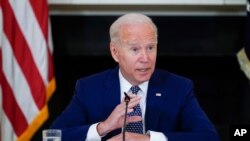U.S. President Joe Biden on Thursday offered an 18-month “safe haven” to thousands of Hong Kong residents to remain living in the U.S. rather than to face repression by being deported to the Chinese-controlled territory.
Biden assailed Beijing’s 14-month crackdown on democracy in Hong Kong and said it was in “compelling” U.S. foreign policy interests to allow Hong Kong residents to stay and work in the U.S.
In a statement China’s foreign ministry branch in Hong Kong said Biden, "By offering so-called ‘safe haven,’ . . . is trying to bad-mouth Hong Kong, smear China, and engage in actions to destroy the city’s prosperity and stability," according to a report by Reuters.
The precise number of people affected by the order was not immediately clear, but a senior Biden administration official said most of the 330,000 Hong Kong residents living in the U.S. are likely eligible to stay, excepting any people who have been convicted of serious criminal offenses.
In his order, Biden said at least 100 opposition politicians, activists, and protesters have been detained by the Chinese during the last year on an array of allegations, while more than 10,000 individuals have been arrested for other charges in connection with anti-government protests.
“The United States is committed to a foreign policy that unites our democratic values with our foreign policy goals, which is centered on the defense of democracy and the promotion of human rights around the world,” Biden said.
“Offering safe haven for Hong Kong residents who have been deprived of their guaranteed freedoms in Hong Kong furthers United States interests in the region,” the U.S. leader added. “The United States will not waver in our support of people in Hong Kong.”
White House press secretary Jen Psaki said the U.S. strongly opposes China’s use of its National Security Law “to deny basic rights and freedoms, assault Hong Kong’s autonomy, and undermine its remaining democratic processes and institutions.”
“Given the politically motivated arrests and trials, the silencing of the media, and the diminishing the space for elections and democratic opposition, we will continue to take steps in support of people in Hong Kong,” Psaki said.
Hong Kong is a former British colony, which returned to Beijing’s control in 1997.
As the Chinese crackdown on dissent has continued, the U.S. last month imposed more sanctions on Chinese officials in Hong Kong. It advised businesses about the risks of operating under the national security law, which China implemented last year to criminalize what it considers subversion, secessionism, terrorism or collusion with foreign forces.




